 MyDogBreeds
MyDogBreedsBoth Catahoula Bulldog and American Molossus are originated from United States. Both Catahoula Bulldog and American Molossus are of same height. Both Catahoula Bulldog and American Molossus are having almost same weight. Both Catahoula Bulldog and American Molossus has almost same life span. Catahoula Bulldog may have more litter size than American Molossus. Catahoula Bulldog requires Low maintenance. But American Molossus requires Moderate maintenance
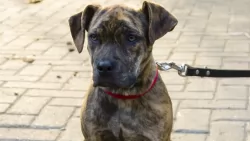 Long ago, ranchers kept the Catahoula Leopard to catch and carry prey, but because it lacked the strength to do so, they would include other stronger dogs in the pack. The American bulldog was more well built, stronger and more aggressive, and the idea was to mix the American Bulldog with the Catahoula Leopard Dog. This brought about the Catahoula Bulldog which has been in existence for some 100 years.
Long ago, ranchers kept the Catahoula Leopard to catch and carry prey, but because it lacked the strength to do so, they would include other stronger dogs in the pack. The American bulldog was more well built, stronger and more aggressive, and the idea was to mix the American Bulldog with the Catahoula Leopard Dog. This brought about the Catahoula Bulldog which has been in existence for some 100 years.
The Catahoula Bulldog became known for its stamina and strength and in 1951 the breed registry started. As a hybrid, the Catahoula Bulldog isn’t officially recognized by the American Kennel Club.
Based on the massive dog of Mesopotamia in 5000 BC, the American Molossus is the same dog recreated in the United States by and for the lovers of these giant dogs. The ancient Molossus was fierce to look at, massive in size, courageous and loyal. He was undaunted by any animal and stood up to any man attempting to hurt his master. When Rome fell the descendants of today’s Molossus were scattered and attempts to revive the breed have created carious large dogs. The American Molossus is the first true recreation that hits the mark.
The original Molossus was one of the most primitive of dogs, one of the earliest dogs that men domesticated. Their initials duties were the guarding of herds and homes against all enemies. They were incredibly loyal to their one master and stayed with him and protected him. These dogs also ate carrion and served the villages by eliminating animal carcasses. They could handle any other hunting animals such as wolves and large cats. This dog, although extinct was the ancestor of all the Mastiff-type dogs of today. The Molossus is said to be the ancestor of the St. Bernard, English Mastiff, Greater Swiss Mountain Dog, Bernese Mountain Dog, Newfoundland, Great Dane, Great Pyrenees, Rottweiler, Rottweiler and the Neapolitan Mastiff. Now these breeds have become the ancestry of the American Molossus.
According to Marcus Curtis, the founder of the new Molossus, the nearest relative of the American Molossus is the Neapolitan Mastiff. The Hines Bulldog, German Rottweiler, American Bandogge, and South African Boerboel together with the Neapolitan Mastiff were used to form the American Molossus. The goal of the founder was to make a great family pet and protector. It was specifically bred to be courageous, loyal and protective.
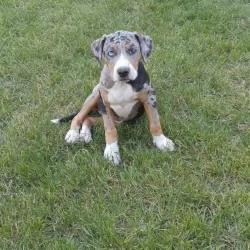 The Catahoula Bulldog is a strong-looking, medium- sized dog of 55-66cm in height and weighing in at 34-46kg. He has a short, smooth, water-repellent coat. The coat can be in a number of colors – white, brown, black or grey or he can be bi-colored such as in brown and black or white and black.
The Catahoula Bulldog is a strong-looking, medium- sized dog of 55-66cm in height and weighing in at 34-46kg. He has a short, smooth, water-repellent coat. The coat can be in a number of colors – white, brown, black or grey or he can be bi-colored such as in brown and black or white and black.
The dog appeals to a lot of people because it sheds very little. The ears of the Catahoula Bulldog are somewhat floppy and the long tail is mostly docked. The dog has unusual eyes and these can be brown, but also in shades of blue or green or even a combination of these colors.
This is a relaxed dog breed but having said that, he is also a protective breed, and then his fearless qualities come out. He becomes alert to strange noises. He is loyal and intelligent and loves to spend time with his human family. He is somewhat stubborn and independent, and early training and socialization should be provided. This ensures he is even more amicable around children in the home as well as around pets.
This is a giant, massive dog in every way and this recently developed standard makes that very clear. The Molossus should be heavy bones, muscular with a lot of loose skin and wrinkles of all kinds, everywhere. He is an intimidating presence, with a massive square head, broad shoulders, height and mass. No, the American Molossus is not athletic, but he certainly is intimidating.
His head is massive in comparison to his body and it must be square. He has extensive wrinkles and pendulous lips and dewlap. The face is all folds of skin and wrinkles. Deep set eyes, drooping upper lids and lower lids as well as an intimidating expression. His brow is well developed with a marked frontal furrow. The nose is large, and the muzzle is about a third of the length of its head. It is short and broad. Everything about the head must be square. It’s neck and body are powerful and muscular. The chest is deep, wide and barrel like. The back is also powerful and muscular. The front legs are heavy and muscular while the hind legs are broad, strong, powerful and wide-stance. Do not remove the front dew claws. His tail is thick and wide then gradually tapers at the tip.
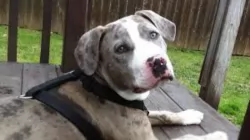 The Catahoula Bulldog is such an all-round dog breed – he loves to work and be active but he also loves to be with his human family. He is smart, active, loving and devoted and makes a splendid working dog or human companion, though he will always need to be kept busy.
The Catahoula Bulldog is such an all-round dog breed – he loves to work and be active but he also loves to be with his human family. He is smart, active, loving and devoted and makes a splendid working dog or human companion, though he will always need to be kept busy.
He is a healthy dog breed too, and is actually low maintenance which is just one of the many advantages of keeping him as a pet.
For all that he offers you, it is up to you as a responsible dog owner to provide him with a loving and nurturing environment so that he can continue to live up to the high standards this dog breed is known for.
The American Molossus is an intimidating massive giant bred for protection and guard duty. He is incredibly loyal to his family and courageous in his protection of them. They are guard dogs, not attack dogs. Their simple appearance is usually enough to frighten off anyone intending harm on their families. He is in reality a loving giant. He is intelligent and stable with a strong desire to please his owner. He is a calm yet vigilant presence in the home.
Because the Molossus is so large, it is recommended that the puppy be socialized and trained professionally. It takes a strong owner to handle this breed. They need to know the rules and have the rules consistently applied. The owner must be the pack leader.
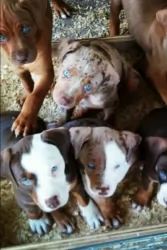 The Catahoula Bulldog is known to be a robust dog breed, full of energy. With good care – healthy diet, clean, fresh water and love and attention – he can live up to be between 10 and 16 years of age.
The Catahoula Bulldog is known to be a robust dog breed, full of energy. With good care – healthy diet, clean, fresh water and love and attention – he can live up to be between 10 and 16 years of age.
However, with every dog breed there will be some common dog ailments to watch for and these include hip dysplasia, some eye disorders and congenital heart defects. Some Catahoula Bulldogs can become deaf in one ear, or blind in one eye.
Like all Mastiffs the American Molossus faces a variety of potential illnesses, some brought on by its size, some not.
This could easily be a function of its massive size. It is a degenerative disease and can cause the dog to become lame. In many cases the vertebrae can fuse, or severe pain can result. This is mostly seen in older members of the breed.
Male Molossus can contract this inherited metabolic disease primarily. It can be life threatening and very serious as it affects the kidney and the bladder.
This is essentially Cervical Vertebral Instability (CVI) and is caused by the pressure of the nerves in the neck and cervical spinal cord. This compression can cause deformity, pain and abnormal stance/gait. IT has been attributed to the nutrition needs and rapid growth of the Mastiff breeds.
Like all giant Mastiff breeds the Molossus can have skin issues from the wrinkles, dysplasia in the joints which we will address below.
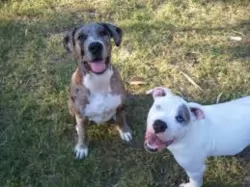 The energy levels of the Catahoula Bulldog are high and he is going to need ongoing mental- and physical stimulation. He wants to be part of all the activities in the family and you will need to take him for walks or take him with you when you go cycling or jogging. He’ll love to join in with all kinds of ball games.
The energy levels of the Catahoula Bulldog are high and he is going to need ongoing mental- and physical stimulation. He wants to be part of all the activities in the family and you will need to take him for walks or take him with you when you go cycling or jogging. He’ll love to join in with all kinds of ball games.
The best kind of environment for the Catahoula Bulldog is a country home with lots of fields to run in, but if you keep him in the city, he can do well provided you make sure to include plenty of daily exercise activities for him.
The short, smooth coat of the Catahoula Bulldog won’t require much grooming, so a good brush twice a week will be excellent for this dog who will just love the interaction this activity brings.
Ensure that your Catahoula and Bulldog mix has food which is full of vitamins and minerals as he is an energetic dog. If you make use of a commercially manufactured product, make sure it is one of the top quality ones guaranteed to ensure good health.
Don’t just put a bowl of dog pellets in front of your dog day after day, but make it interesting and nutritious for your pet by adding in raw meat, rice, vegetables and some cooked meat from time to time. An adult dog can be fed once or twice a day.
Remembering that this is a very, very large dog you need to be careful about nutrition and how fast your puppy will grow. American Molossus puppies need four meals a day until 12 weeks old. Then until they are 6 months old feed then 3 times a day. Finally, from 6-month-old puppy to adult – feed them twice in 24 hours.
At one year either feed them once or two small meals.
Many people feed their Molossus eggs, vegetables, fruit, and cottage cheese as ten 5 of the total for the day but avoid other table foods. The Molossus can become very picky about what he eats if you feed him too many table scraps.
In addition to the health problems listed above, the American Molossus is also susceptible to: Ditichiasis – Eyelashes that are in the margin of the eyelids and can cause eye irritation. May require surgery to correct.
Could cause blindness if not removed. Ectropian/Entropion: Eversion and inversion of eyelids which cause ocular irritation.
This is a degenerative disease which causes the dog to go blind. It is a disease the affects the retinal visual cells, first causing night blindness then day blindness. A DNA test is available for detecting PRA in all Mastiff breeds.
Common in large breeds and especially in giant breeds like the Molossus. Multiple forms and causes but all can cause pain and lameness.
Do to wrinkles and loose skin – check often for moisture and infections.
The is a problem based on a variety of possible causes. It happens when the puppy is between 6-16 months of age. Lameness occurs over time in one limb or in all. It can be intermittent and might be caused by diet, genetics, stress, autoimmune or metabolic issues or infection.
This issue is developmental as the dog’s toes turn either inward or outward, then as the condition advances the dog suffers fever, pain in all joints, lethargy and the inability to stand. This happens when the dog consumes too many calories for his activity level in the development times.
The American Molossus is not a couch potato. He needs to be walked at least twice a day and loves to play fetch. He will be greatly benefited by obedience training. Do not overdo it with exercise but make sure they don’t just lay around.